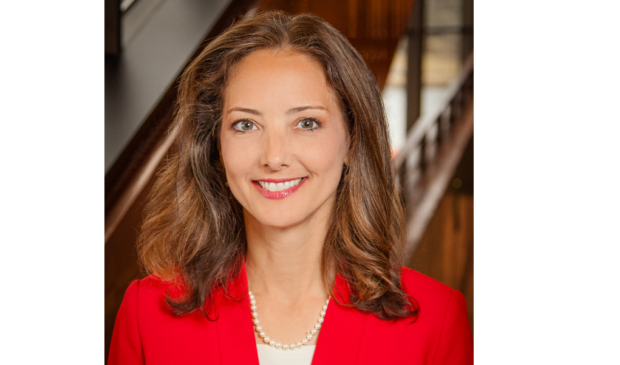Tovo reflects on a year of challenge and success
Thursday, December 26, 2019 by
Jo Clifton As she looks back on 2019, Council Member Kathie Tovo can count some major victories, including passage of her expansive resolution directing enhancements to a lengthy stretch of downtown parkland leading up to Palm School, direction to begin creation of a Mexican American heritage corridor, and authorizing renovation and expansion of the convention center.
“That was a heavy effort and an exciting one,” Tovo said. She notes some of the moving pieces: designating the Rainey Street historic district; getting money through the city’s Hotel Occupancy Tax for the Mexican American heritage corridor wayfinding project; and establishing the Waterloo Greenway initiative under the umbrella of the city, along with the Waterloo Greenway Conservancy.
Although Travis County, not the city, owns Palm School, Tovo is hopeful that the two municipal governments can work together to preserve the school and its surroundings.
As for the convention center expansion, Tovo says she favors it as part of the Palm School master plan. “I am supportive of expanding if we’re doing so in a way that improves the whole downtown landscape.” She said she expects a renovated convention center to make that part of downtown more attractive, not just for conventiongoers but for everyone. She will be watching to make sure that the changes enhance the Waterloo Greenway and other area attractions.
Dealing with homelessness and revisions to the Land Development Code have both been big issues in District 9.
When she looks back on what most people would see as a major defeat – first reading adoption of a new Land Development Code – Tovo does not sound defeated. Rather, she is planning to continue her struggle against provisions that greatly expand density in her part of the city.
“My district has been proposed for extremely major changes in every neighborhood,” she told the Austin Monitor. “If you look at District 9, nearly 50 percent of the properties (in some neighborhoods) are proposed to be rezoned, a pretty significant impact compared to what’s proposed throughout the city.”
She said her constituents are not alone in their distress about the proposed changes. “I cannot emphasize the breadth and amount of upset about the changes” that the new code would allow, “from one end of the city to another.” But District 9, the central city, is certainly the bull’s-eye for increased density.
She hopes that in the months ahead, Council will rework the new code so that there is increased density on major corridors, but not in “big swaths of neighborhoods as this plan does.” Tovo argues that the new code, as currently configured, affects the central city more than districts 6 in the north and 8 in the south, for example. She hopes her colleagues will reconsider changes approved in December that would allow housing she believes is “far in excess of the capacity that we said we needed.”
Tovo, along with Council members Ann Kitchen, Leslie Pool and Alison Alter, were on the losing end of the vote on the new code, and despite Tovo’s stated optimism about major changes, it seems unlikely that any changes staff might propose would be as extensive as the four of them would like to see.
There was more consensus on the dais over dealing with the city’s homeless population and repealing ordinances directing police to arrest people panhandling and resting or camping in public places. Tovo said she voted in favor of repealing the first two ordinances, but was against immediately lifting the camping ban.
Many of Tovo’s constituents, particularly those with downtown condos and businesses, were upset about the repeal, but the hot topic of the moment is the Land Development Code.
Although Tovo tried to get funding for homelessness initiatives increased to $3 million in the 2018-19 city budget, she recalled that the motion failed on a 5-6 vote, “so we ended up with $1.5 million.” However, she and her colleagues increased that amount to $3 million for the current budget after Council voted to eliminate the no sit/no lie and camping ordinances.
Tovo was a strong advocate for city funding for the Salvation Army Rathgeber Center, a shelter for women and children. The city provided $1 million in funding, which was also intended to help ease the burden on the downtown shelter. In October 2021, the Rathgeber Center is slated to operate on private funding only. At the same time, the city provided an additional $500,000 on its existing contract for changes at the Austin Resource Center for the Homeless downtown. She pointed out that moving women and children to the Rathgeber Center would somewhat ease the burden on the downtown shelter, which is being redesigned to offer more case management.
Tovo said she has more plans for 2020, including continued work with the Austin Sobering Center, where she serves as a board member, and fighting against human trafficking, among other things.
The Austin Monitor’s work is made possible by donations from the community. Though our reporting covers donors from time to time, we are careful to keep business and editorial efforts separate while maintaining transparency. A complete list of donors is available here, and our code of ethics is explained here.
You're a community leader
And we’re honored you look to us for serious, in-depth news. You know a strong community needs local and dedicated watchdog reporting. We’re here for you and that won’t change. Now will you take the powerful next step and support our nonprofit news organization?









